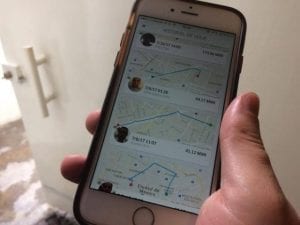With the initiative’s passage, gig-based companies like Uber and Lyft can continue denying benefits to their contractors.
California voters have passed Proposition 22, which exempts companies like Uber and Lyft from having to reclassify their independent contractors as regular employees.
CNN notes that companies kept afloat by the so-called “gig economy” poured massive amounts of money into a pro-Proposition 22 advertising campaign. Uber, Lyft, DoorDash, and similar firms spent an estimated $200 million marketing and lobbying for the passage of Proposition 22.
The initiative—also known as the App-Based Drivers as Contractors and Labor Policies initiative—allows some businesses reliant on gig labor to sidestep the provisions of Assembly Bill 5, or AB5.
That bill, as LegalReader’s reported before, required companies employing contractors to show that their workers might “ABC” criteria exempting them from employee status. Uber and its allies pushed back hard against Assembly Bill 5, alleging that many of their workers enjoy the flexibility of contractor positions.
“California has spoken and millions of voters joined their voices with the hundreds of thousands of drivers who want independence plus benefits,” the “Yes on 22” campaign said in a statement released earlier this week. “Prop 22 with protect drivers’ preference to be independent contractors with the flexibility to work when, where, and how long they want.”

Proposition 22, adds CNN, did offer gig workers some concessions. Eligible contractors will be entitled to a minimum earnings guarantee based on the “engaged time” drivers spend fulfilling a ride or delivery request.
However, they will remain uncompensated for the time they spend waiting for a request or assignment.
In spite of Proposition 22’s barebones concessions, critics have said the measure does little to protect contractors. It does not, for instance, allow gig workers to receive critical benefits such as workers’ compensation, unemployment insurance, or paid sick leave.
A coalition of affected contractors suggested that Proposition 22 is effectively a form of corporate subversion.
“Billionaire corporations just hijacked the ballot measure system in CA by spending millions to mislead voters,” they wrote on Twitter. “Uber, Lyft, & the other gig [companies] took a ballot measure meant to give voice to ordinary Californians and made it benefit the richest [corporations] on the planet.”
According to The New York Times, many labor activists and local politicians have likewise expressed disappointment in Prop 22’s passage. Dennis Herrera, San Francisco’s city attorney, said that rideshare and other gig-based companies have managed to escape intensive regulation because few policy-makers realized, just several years ago, how powerful these corporations would become.
“For all too long, Uber and Lyft banked on the timidity of public officials throughout the country,” Herrera said. “They said, ‘We’re not going to ask permission. We’ll sort of ask forgiveness after the fact, once the horse has left the barn.’”
Lorena Gonzalez–the California Assembly member who drafted AB5—concurred, saying she sponsored her legislation out of necessity.
“The problem is this,” Gonzalez said. “Uber and Lyft have neglected not just labor laws but every law in the book.”
“We can’t just allow them to control what the future of work looks like,” she added. “Somebody has to stand up for the future of workers.”
Sources
Prop 22 passes in California, exempting Uber and Lyft from classifying drivers as employees


Join the conversation!